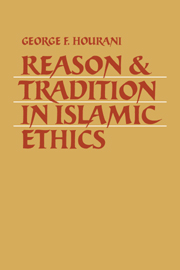Book contents
- Frontmatter
- Contents
- Preface
- Foreword by Michael Marmura
- Conventions
- Titles and locations of the original articles
- Introduction
- 1 Islamic theology and Muslim philosophy
- 2 Ethics in classical Islam: a conspectus
- 3 Ethical presuppositions of the Qurʾān
- 4 ‘Injuring oneself’ in the Qurʾān, in the light of Aristotle
- 5 Two theories of value in early Islam
- 6 Islamic and non-Islamic origin of Muʿtazilite ethical rationalism
- 7 The rationalist ethics of ʿAbd al-Jabbār
- 8 Deliberation in Aristotle and ʿAbd al-Jabbār
- 9 Ashʿarī
- 10 Juwaynī's criticisms of Muʿtazilite ethics
- 11 Ghazālī on the ethics of action
- 12 Reason and revelation in Ibn Ḥazm's ethical thought
- 13 The basis of authority of consensus in Sunnite Islam
- 14 Ibn Sīnā's ‘Essay on the secret of destiny’
- 15 Averroes on good and evil
- 16 Combinations of reason and tradition in Islamic ethics
- Select bibliography
- Index
14 - Ibn Sīnā's ‘Essay on the secret of destiny’
Published online by Cambridge University Press: 13 October 2009
- Frontmatter
- Contents
- Preface
- Foreword by Michael Marmura
- Conventions
- Titles and locations of the original articles
- Introduction
- 1 Islamic theology and Muslim philosophy
- 2 Ethics in classical Islam: a conspectus
- 3 Ethical presuppositions of the Qurʾān
- 4 ‘Injuring oneself’ in the Qurʾān, in the light of Aristotle
- 5 Two theories of value in early Islam
- 6 Islamic and non-Islamic origin of Muʿtazilite ethical rationalism
- 7 The rationalist ethics of ʿAbd al-Jabbār
- 8 Deliberation in Aristotle and ʿAbd al-Jabbār
- 9 Ashʿarī
- 10 Juwaynī's criticisms of Muʿtazilite ethics
- 11 Ghazālī on the ethics of action
- 12 Reason and revelation in Ibn Ḥazm's ethical thought
- 13 The basis of authority of consensus in Sunnite Islam
- 14 Ibn Sīnā's ‘Essay on the secret of destiny’
- 15 Averroes on good and evil
- 16 Combinations of reason and tradition in Islamic ethics
- Select bibliography
- Index
Summary
On several occasions in his writings Ibn Sīnā discusses the problem of destiny (al-qadar), by which he means primarily the problem of reconciling the divine determination of human acts and characters with the rewards and punishments of the after-life, in such a way as to safeguard God's justice to man. This aspect of the problem of theodicy had arisen long before his time out of statements of the Qurʾān and Traditions, and had been settled in their own fashions by Muʿtazilite and predestinarian theologians. Ibn Sīnā as a philosopher could hardly avoid offering a solution, if only to satisfy the doubts of his Muslim public; but he goes beyond a perfunctory answer, and seems to show a genuine interest in finding an intellectually convincing solution consistent with his own philosophy. As would be expected, he interprets the data of the problem in his own terms and comes up with a distinctly Neoplatonic answer, while taking care to express this in a way that might have a chance of acceptance in his religious milieu, Muslim Iran of the early eleventh century a.d.
The word ‘destiny’ in the title and text of this article is used as a deliberately ambiguous translation of Arabic al-qadar. Omitting complexities, we may for our purpose distinguish two main significations of the word in the religious context of earlier Islam. The older usage is ‘predestination’ of human acts and characters by a freely willed decision of God for each person.
- Type
- Chapter
- Information
- Reason and Tradition in Islamic Ethics , pp. 227 - 248Publisher: Cambridge University PressPrint publication year: 1985
- 2
- Cited by



